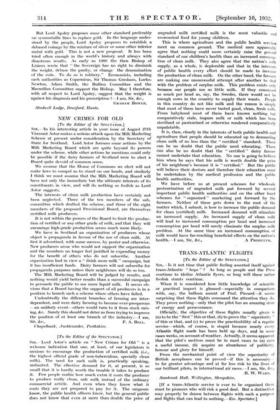[To the Editor of the SPECTATOR.] SIR,—Lord Astor's article on
"New Crimes for Old" is a welcome indication that one, at least, of our legislators is anxious to encourage the production of certified milk (i.e., the highest official grade of non-tuberculous, specially clean milk). The need for such milk is, practically speaking, unlimited. The effective demand for it, at present, is so small that it is hardly worth the trouble it takes to produce it. Few people realize how much extra it costs the producer to produce really clean, safe milk instead of the Ordinary commercial article. And even when they know what it costs they are not prepared to pay for it. The surgeons know, the public health officers know, but the general Ohne does not know that even at more than double the price of
ungraded milk certified milk is the most valuable and economical food for young children.
This is where agriculture and the public health services meet on common ground. The medical men apparently agree that nothing could more certainly raise the general standard of our children's health than an increased consump- tion of clean milk. They also agree that the nation's milk supply, as a whole, is deplorable and that in the interests of public health every effort should be made to increase the production of clean milk. On the other hand, the farmers are making one unsuccessful attempt after another to deal with the problem of surplus milk. This problem exists only because our people use so little milk. If they consumed as much per head as, shy, the Swedes, there would not be enough cows in the country to supply their wants. People in this country do not like milk and the reason is simply that most of them have never tasted good, clean, fresh milk. From babyhood most of them have known nothing but comparatively stale, impure milk or milk which has been sterilized or pasteurized or otherwise rendered comparatively unpalatable.
It is, then, clearly in the interests of both public health and agriculture that people should be educated up to demanding clean milk of no less than the " certified " standard. There can be no doubt that the public need educating. There elan also be no doubt that the " certified " dairy farmer ca. nnot undertake that education. No one is going to believe him when he says that his milk is worth double the price of his neighbour's because it is "certified." But the public will believe their doctors and therefore their education must be undertaken by the medical profession and the public
health authorities. • We have before us at present schemes for wholesale pasteurization of ungraded milk put forward by several important public health authorities and on the other hand schemes for " organized " marketing put forward by the farmers. Neither of these gets down to the root of the matter which, I submit, is how to increase the public demand for clean (certified) milk. Increased demand will stimulate an increased supply. An increased supply of clean milk will lead to increased consumption per head and increased consumption per head will surely eliminate the surplus milk problem. At the same time an increased consumption of milk would have far-reaching beneficial effects on the nation's






























 Previous page
Previous page